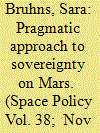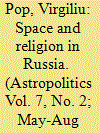| Srl | Item |
| 1 |
ID:
157167


|
|
|
|
|
| Summary/Abstract |
Rising interest in Mars colonization from both private and public sectors necessitates a renewed discussion about sovereignty in space. The non-appropriation principle of the Outer Space Treaty currently prohibits any sovereign claims to celestial bodies, but it remains unclear how this principle should be applied to the peaceful colonization of Mars. Here we develop a pragmatic approach to guide the settlement of Mars, which is based upon a “bounded first possession” model with mandatory planetary parks. Scientists, experts, and leaders will establish planetary park locations and regulations through worldwide community solicitation in order to protect sites of scientific, aesthetic, historical, cultural, environmental, spiritual value. Colonization parties may occupy limited plots of martian land and may claim exclusive economic rights within this zone, while still refraining from any claims to sovereignty. All colonists remain under the legal jurisdiction of their host nation, with conflicts to be resolved diplomatically or through a temporary tribunal system composed of representatives from other Mars colonies. We also propose the formation of a Mars Secretariat as an administrative body with limited power to facilitate communication among parties. Our model for Mars colonization remains consistent with the Outer Space Treaty, but we also recommend revisiting or amending the non-appropriation and province of mankind principles to resolve the ambiguity of how nations, corporations, and individuals may utilize the resources of space.
|
|
|
|
|
|
|
|
|
|
|
|
|
|
|
|
| 2 |
ID:
090001


|
|
|
|
|
| Publication |
2009.
|
| Summary/Abstract |
This article follows the evolution of the relationship between the Russian space program and spirituality from an astrosociological perspective. It demonstrates that the Russian space program has its roots in Nikolai Fedorov's Cosmism, which envisaged the technological resurrection of the dead and space colonization, and in Marxism, which used space exploration as a means of proving atheism. Whereas the conquest of space has been perceived throughout the world in an ambivalent way, either as an act endorsed by Divinity or as a blasphemous feat, the Soviets took pride in reinventing the "Tower of Babel" in order to "make a name for themselves" and dethrone God (Genesis 11:4). Moreover, the technological miracles of spaceflight and the worship of Yuri Gagarin support the view that Soviet Communism was a state religion. After the fall of the Soviet Union, Orthodox Christianity brought its own contribution to the Russian space program. It will be also shown that, even during the Soviet period, appearances contrasted with the feelings of many of the cosmonauts.
|
|
|
|
|
|
|
|
|
|
|
|
|
|
|
|